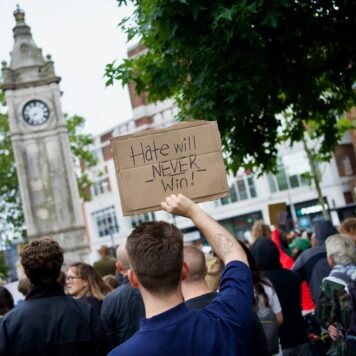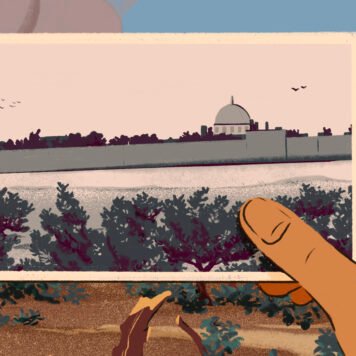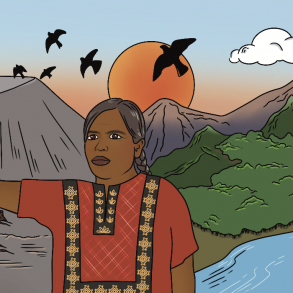[The child] must become a thing, an object. Its questions are met with narrow, conventional, ridiculous replies, mostly based on falsehoods; and, when, with large, wondering, innocent eyes, it wishes to behold the wonders of the world, those about it quickly lock the windows and doors, and keep the delicate human plant in a hothouse atmosphere, where it can neither breathe nor grow freely.
Emma Goldman, 1906
I have always known that parts of my identity did not ‘fit’ with being a teacher. At the start of my PGCE four years ago, I mentioned my chronic illness to my cohort and one of my coursemates laughed at me – “how are you going to manage this job?” During my training, I continually read in my lesson observation feedback that I had missed out the requisite uniform check, hadn’t handed out a harsh enough punishment for gum-chewing, or had failed to stop a student from twiddling his pen. When I began to interview for jobs, I got rejection after rejection, told that I was too “eccentric” or a “wild card”. Even once I found a job in a school I loved – an SEN (Special Educational Needs) setting where I wasn’t bound to an exam syllabus or rigid set of rules about gum – there were still some parts of me that I knew I couldn’t bring to school. The part of me that wants an end to capitalism, for example.
Teachers are often vilified in the Daily Mail as ‘loony lefties’, but most teachers are leftists in the feverish imagination of Mail readers and nowhere else. Despite its association with ‘progressiveness’ – a loose, only vaguely-articulated sense of wanting to make things better in the world – teaching is an intensely small-c conservative profession. Although it’s hard to find an outspoken Tory teacher (though there are some), in my staffroom experience most teachers are broadly liberal and centrist, and see that centrism as a virtue – part of our duty to give students ‘both sides’ of an argument. Any political opinion too drastic is not only policed by the legal requirement on teachers to be politically impartial in their teaching, but socially policed by a professional consensus which upholds compromise above all else.
Of course, the problem with a ‘both sides’ approach is what happens when one side keeps acting in bad faith, and pulling the whole discussion drastically to the right.
As we have experienced over the past ten years in almost every sphere of life, what the ‘centre’ has shifted dramatically, and freedoms we may have thought were established beyond doubt are up for debate once more in the name of ‘free speech’. There is no better illustration of this than the PSHE (personal, social and health education) guidance for schools which came out at the end of September. This now-infamous guidance warns schools against using materials or speakers from organisations with “a publicly stated desire to abolish or overthrow […] capitalism”, then in the next breath forbids “opposition to the right of freedom of speech”. Other criteria for banned organisations include “promoting divisive or victim narratives that are harmful to British society” and “a failure to condemn illegal activities done in their name or in support of their cause, particularly violent actions against people or property.” As many people pointed out in the wake of its release, much of this guidance would forbid the government itself from producing PSHE materials if applied to the letter.
There are so many contradictions in this guidance as to make it seem almost innocuous; surely something so clearly self-contradictory, which may not even be statutory, can’t be much of a threat. But this ignores the real consequences the guidance will have. The summer of 2020 saw a wave of protests under the Black Lives Matter banner, some of which involved “violent actions against property” in the tearing down of monuments to violent slave traders and colonisers. The last few years have seen a wave of climate strikes, where protesters have blocked roads and walked out of school. The horizontal organising structure of activist groups like BLM and XR mean that there is no central ‘management’ responsible for everyone organising under the banner, so these organisations could easily fall under the “failure to condemn illegal activity” clause. When read through this lens, the guidance is not contradictory or inept: it is a calculated attack on movements for urgent social justice, an ‘act of racial gaslighting” designed to intimidate the government’s opponents and embolden its far-right supporters.
The guidance also means that activists from the global majority – who may have organised with BLM – will find it more difficult to be invited to speak in schools. It is also a clear signal to everyone in education about what ‘neutrality’ is expected to look like. Talking about ‘victim narratives’ counts as neutral; opposing the embedded structures of colonial capitalism is not. White supremacy is neutral; opposing it is ‘political’. This was all but solidified in a speech made in Parliament by Conservative MP Kemi Badenoch last week, wherein she stated that “This [Tory] government stands unequivocally against Critical Race Theory”. The Department for Education might not know about it if I tell my students about anti-capitalism or white privilege, but it doesn’t have to: schools police themselves. Terrified of Ofsted and league tables, schools are their own enforcers, striving to predict and enact what the government wants before it’s even made it to policy. It takes brave school leadership to deviate even slightly from these norms, and an even braver one to take an explicitly ideological stand. It doesn’t matter, then, if parts of this guidance aren’t statutory or legally enforceable – its aim is to create fear and self-enforced compliance.
If you’re not a teacher, you may be wondering what you can do to help in this increasingly frightening environment. In fact, people outside teaching – who aren’t governed by the weaponised ‘neutrality’ requirements I’ve described – might be better positioned to amplify voices that need amplifying in public. You can share the crowdfunder by the Coalition of Anti-Racist Educators to challenge this guidance in the courts on explicitly anti-racist campaigns. You can support radical, Black-led campaigns like No More Exclusions and Kids of Colour which take explicitly abolitionist, anti-racist positions and support those who will be at the sharp end of an emboldened far-right in education.
Within the teaching profession, we need teachers who can acknowledge our project as a political one. We need teachers who refuse this false idea of neutrality, who recognise that the fight we are in now goes beyond politeness and civility. I write under a pseudonym and tweet from behind a cartoon profile picture because I cannot afford to be doxxed and fired, but teachers with bigger profiles who write under their real names can lead the way and set precedents. Those of us who can’t afford to risk our jobs can at least begin the work of freeing ourselves within our minds: critically examining our position of power over others, refusing to swallow apolitical notions that we are ‘doing good’, and embracing teaching as an act that can only ever be political.
If you are an educator, student or parent who feels their practice or educational experiences might be negatively affected by this guidance, CARE/BEA’s legal team need your help – please answer their call for evidence.

Follow more of Natasha’s work on Instagram here.













